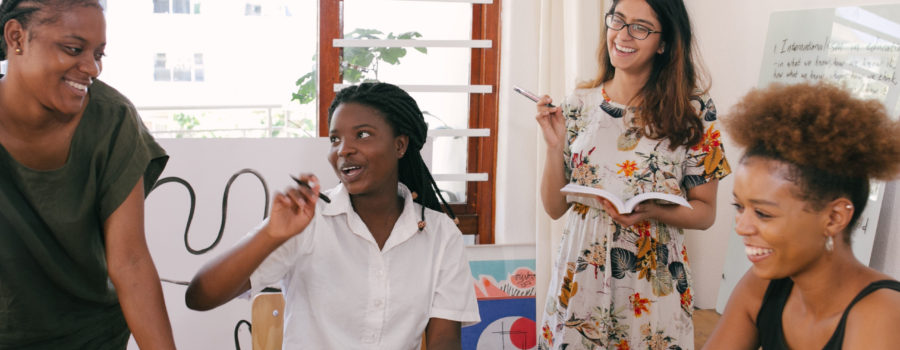Introduction
Hello! It’s Kristine here with the Express to Impress podcast.
Many Express to Impress podcast listeners are language learners, so I’ll dedicate some episodes of this podcast to language learning. I already released the episodes Introducing the Shadowing Technique for English Learning and American English Pronunciation Tips for Workplace Success, which have already been downloaded more than 200 times! I hope this episode will be a hit, too! Today, you’ll learn how to learn a new language.
Every week, I post a new episode to help you communicate clearly and confidently in your job search, interviews, and the workplace. If you like my podcast, don’t forget to subscribe to get new episodes. You can subscribe anywhere you download podcasts like Apple, Pandora, or my website at express-to-impress.com.
Now, let’s begin!
Interesting Facts About People Who Learn A New Language
Why are you learning another language?
For some people, learning another language is a means to an end. It will allow them to reach other goals, like working and living in an English-speaking country. If only seen from that perspective, then learning another language can feel like a chore or burden. So, it’s best to have many motivations for learning another language.
Now, let’s look at some of the many benefits of learning multiple languages, and you can decide which are most attractive to you!
Learning Another Language Can be Fun!
I can’t promise every single moment of learning a language will be fun, but you WILL have some fun with it. You’ll also feel proud of yourself.
Speaking Multiple Languages Lowers Your Risk of Dementia.
Studies show that speaking multiple languages boosts brain health and lowers the risk of dementia. Anyone who has seen a family member lose cognitive function will feel empowered to do something to reduce that risk.
Multilingualism Increases Your Earning Potential.
Candidates who speak several languages are more attractive to employers and earn more money!
Speaking in Another Language Brings Out Different Aspects of Your Personality.
When you talk in another language, you don’t directly translate words and phrases from your native language. You try to speak like a native, and the words and phrases you use are often different from those you use in your mother tongue. You communicate in a new way and even adopt new ways of expressing your body language and personality within the culture.
You’ll Open the Door to More Entertainment Options.
When you learn another language, you have more options on Netflix! Not only that, you can discover new authors and learn about history from a new perspective.
You Can Use Your Language Skills to Help Others.
Whether volunteering to help non-native speaking children with their homework or talking in Spanish, Arabic, or another language when you realize someone is struggling to speak in your native language, you can encourage and connect with other people.
Talk about motivation!
So, which benefits of learning a new language matter most to you? I suggest writing them down and placing them where you can see them when studying the language. It will come in handy when you need a pick-me-up!
Story
Now, I will tell you a little about my experience of learning Portuguese. Earlier this year, I set out to travel and work abroad for six months. But with the onset of the pandemic, I stayed put, in Brazil! Before arriving, I learned some basic greetings, but I’d only intended to be in Brazil for one month, so I hadn’t taken learning Portuguese seriously. But I figured that if I was going to live in Brazil, I had better learn more about the language!
While I didn’t need to learn Portuguese for my job, I knew it would help me be more independent and make some new friends. Plus, learning another language had been fun for me in the past, and I had a strong foundation in Spanish. I also had a huge leg up as my partner speaks Portuguese fluently.
Soon, I discovered that I had no interest in watching TV to learn Portuguese because it was way too fast. I also understood that it would be more difficult because people were wearing masks, and it was hard to hear what they said. But I found a few things that were fun and worked for me.
Reading is fun for me, so I bought a couple of books. I started off reading The Little Prince. I needed to learn to pronounce Portuguese correctly, so that was my main focus at first. My partner taught me the differences in pronunciation from English, and then I did my best to pronounce words correctly, and he would correct me when I was wrong. Eventually, I formed new habits and felt really proud of my progress. Unfortunately, even though I was pronouncing words correctly, my rhythm was off, and I sounded like I was speaking Spanish with a Portuguese accent. So, I started using the Shadowing Technique.
My partner would read a phrase or sentence, and then I would repeat what I heard as closely as possible. Once I had made significant progress on pronunciation and rhythm, I started to translate the pages as best I could. Portuguese is remarkably similar to Spanish, so I could read pretty well right away, which felt very encouraging. It was important not to ask for help with each word I didn’t know but to try to figure it out myself first based on the context. After the Little Prince, I read a large pop-up picture book of palaces around the world. Seeing pictures of the things I was reading about helped me figure out new words. I also read an old National Geographic I picked up from March 1987.
Listening to a new language spoken is very important to learn how another language is spoken and pronounced, but quite tricky at first, so I found a podcast designed for Portuguese learners. It was all in Portuguese, but the speaker articulated words carefully, making it easier to understand. I also slowed down the podcast to 85% of the normal speed to make it easier to process, which also made it possible to use the shadowing technique.
There are so many great opportunities for people watching on a beach! So, I took it all in, watching people dance, play beach tennis, footvolley, volleyball, and capoeira. I kept my phone nearby and write down phrases I heard, and my partner would translate. After all, those phrases were relevant and important because they were being used right there on the beach. I also jotted down things I wanted to say but couldn’t. So, if I had an interaction with somebody selling something, for example, and I wanted to know how to express myself, I would stumble at the moment but then look it up afterward.
Consistency is key for learning another language, so I set some small, attainable goals. For example, I wanted to practice Portuguese intentionally daily, even if just for five minutes. So, to hold myself accountable, I placed a sticky note on the front door each week with Monday through Sunday listed and put a check next to the day once I had studied Portuguese.
In time, I decided to train with a volleyball coach, so I set out to learn the vocabulary I could hear on the court. First, I looked up the definitions of common volleyball terms and then added them to Anki, a free flashcard program. I also began watching volleyball on TV and wrote down new phrases with their definitions in Anki. I reviewed the flashcards daily until I knew all definitions. On the court, I learned even more phrases from my coach. While he only spoke Portuguese, my training partner helped translate as needed. I made an effort to speak, even though it was very difficult at first. It helped that my coach was encouraging of my efforts to learn the language.
Then, I started playing volleyball with locals, and being immersed in Portuguese fast-tracked my language learning. I became very familiar with the most common phrases and verbs and loved all the joking around. When everyone laughed, I would ask what was so funny. They would try to explain the joke, and sometimes, I would start saying the joke too, which amused them. For example, every time someone spiked a ball, and it went into the net, some of us would yell, “mata sapo!” Literally, that means “Kill a frog!”
One day, I couldn’t play, but I watched and wrote down many new phrases I heard, especially the phrases that made people laugh. Then, I recorded a voice message and shared it with our Whatsapp group, telling my friends I enjoyed learning Portuguese from them and repeated all the new phrases I’d heard on the court. I’m certain my pronunciation and intonation were far from perfect, but it was good for a laugh.
Towards the end of my time in Brazil, a few of us went on a trip to see Pedra Azul (the blue rock), and we decided to only speak in Portuguese. It was the first time I spoke at length in the language. I realized I knew far more than I thought I knew; I had been absorbing a lot of the language from listening to it. It was really fun! Somehow, we spoke for hours in Portuguese. I’m sure I spoke like a child at times, but I was figuring it out and had friends helping me and encouraging me.
So that’s a little about my recent, unexpected, and delightful language-learning experience. I hope you have as much fun learning another language!
Tips for Learning a New Language
Now, I’ll share some tips for learning a new language.
Start Small.
Many learners are burning with enthusiasm at the beginning. They make ambitious plans to study for many hours each day. But their enthusiasm soon wanes, and then they feel disappointed that they didn’t stick to their plans. Big commitments can be overwhelming, so set small, manageable goals. You’ll be likely to surpass them, and learning a language will feel more like a fun hobby than a chore.
Make Learning a Habit.
Our habits determine who we are. If you make learning a new language a habit, you are extremely likely to succeed. When forming a new habit, it’s helpful to do the new activity before or after an already well-established habit. So, choose a strong habit you already have, for example, drinking tea in the evening. Then, spend five minutes learning your target language after that activity. Soon, you will automatically start learning a language after your cup of tea. Once you establish the habit, you can increase the time for the activity.
Make a Plan.
Consistency is the key to learning a language. Make a list of the topics that interest you and how you want to learn. If you find it hard, you can always search for a language learning plan online or hire a tutor to create one specifically for you. Once you have a plan, make sure you accomplish a little step every day.
If you’re an English language learner, I recommend checking out English on the Run, created by a fantastic teacher, Audrey. She’ll give you small daily activities, coaching, and feedback, and most importantly, she’ll make learning English fun for you! She’s also the co-host of the fun podcast You Don’t Say to help language learners build communication skills by listening to real-life, spontaneous conversations in English.
Immerse Yourself in the Language.
Not everyone has the chance to live in a country where people speak the language they want to learn. But there are many ways you can expose yourself to the language. For example, you can change your phone language to the target one, listen to songs, read lyrics, listen to audiobooks, and watch videos. And don’t forget to listen to your favorite audiobooks in your target language! With a familiar storyline, you will understand more and feel encouraged. And watch as many TV series as you can. You will hear many real-life expressions that you’ll never find in the books. And they all will be used in context, so you’ll remember them.
Do What You Like, But in Your Target Language.
If you hate reading, don’t make yourself read a lot in your target language. Do what you enjoy! If you like cars, watch Youtube videos about cars. If you’re into TV series, watch them in your new language! Are you interested in psychology? Read psychological articles in your target language. Make learning fun. You don’t have to struggle.
Keep Yourself Accountable.
When learning a new language, find a friend to join you, or join activities with other language learners. I used to attend Spanish language networking meetups in my city that I found through the online platform Meetup.com. The cost to join the activities was very low, and I was motivated to go not only to learn the language but to see new friends over a delicious meal. If you are shy or want one-on-one attention, you could hire a tutor or join language courses. If you feel like quitting, you’ll remember you already paid for the lesson or dread disappointing your tutor.
Motivate Yourself.
One of the perks of learning another language is being able to speak to locals when you travel to new countries. If it’s in your budget, schedule a trip to a country where people speak your target language. You’ll be excited about the future adventure and motivated to learn more. And after reaching new learning goals, make sure to reward yourself with something you enjoy.
Observe and Listen.
If you want to improve your language skills for your job, you must learn the vocabulary and phrases used in your work environment. So, if you are in a business meeting in a language you are still learning, listen carefully, and write down unfamiliar words. You can ask someone or look up the definitions later. Then, challenge yourself to use that vocabulary in future meetings. Your words will resonate with your audience, and you’ll strengthen your bond and sense of belonging.
Participate and Ask Questions.
When speaking your target language, permit yourself to make mistakes. It’s the best recipe for learning! With that said, it’s vital to try out your new speaking skills in a welcoming environment – a place where people encourage, not discourage you, and a place where you can laugh and joke. Ideally, your audience will know some words of your native language and help out if you get stuck. But the process of trying to express yourself in different ways to get your point across is a terrific way to learn.
Also, if you’re speaking one-on-one with someone in your target language and you’re unsure of what they just said, ask the person to explain it in another way. Nodding your head out of politeness will only lead to misunderstandings, confusion, embarrassment, and delay learning. It can be tough to admit you don’t understand something but rest assured, most people are happy to help out and rephrase what they said.
Alright, now you have many tips to learn a new language while having fun!
How to Succeed in a Job Interview Online Course
If you’re learning English and want to land a job in English, I can help! I specialize in helping non-native English speakers stand out in interviews in English. I work one-on-one with people and offer training in my online course, “How to Succeed in a Job Interview.” In the course, I cover everything from body language to etiquette to answering questions confidently. Included is a step-by-step Job Interview Preparation checklist that I recommend completing before every interview. There’s also 14-pages of common interview questions and tips on how to answer them.
The course is entirely on-demand, which means that you can learn at your own pace. To learn more about my 90-minute course and watch free previews on my website, visit express-to-impress.com. And great news! I’ve extended the 30% off sale until November 10th.
Tune in Next Week
Alright, I invite you to tune in again next week to improve your English skills. You’ll learn definitions of phrases and idioms from this episode.
Thank you so much for listening to the Express to Impress podcast. If you liked this episode, please remember to share it with a friend! See you next time. Bye!
Music By Lucas Knutter







2 Comments
Leave your reply.